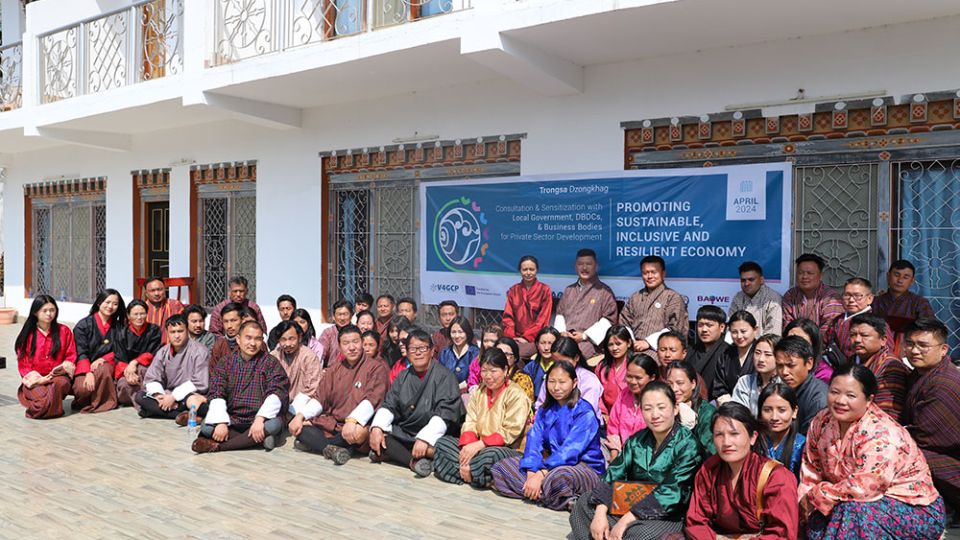April 17, 2024
THIMPHU – The business community has asked the government for policy reforms after stating that they are facing location-specific challenges with a limited consumer base that hinders their growth.
The business community of the nine central and eastern dzongkhags, along with Phuentsholing, shared this during the consultative meeting and awareness sessions conducted by the Bhutan Chamber of Commerce and Industry (BCCI) and the Voice for Green Change Partnership (V4GCP) Project between April 1 and 10.
Businesses expressed a proactive approach to promoting tourism in central and eastern Bhutan. They suggested immediate interventions to facilitate tourist entry and exit through Samdrupjongkhar and Nganglam, as well as enabling local airlines to establish direct flights between these regions and key international hubs.
Business representatives stated that such policy adjustments would naturally attract investments in tourism infrastructure and enhance business services.
According to the press release from the BCCI and V4GCP, policymakers often cite the lack of amenities as a barrier to tourism development.
However, it is increasingly evident that inadequate policies are equally responsible for the region’s underperformance in this sector.
They want the dzongkhag administrations to develop enticing tourism packages in response to any shift in tourism policies.
BCCI and V4GCP recognise the immense potential of central and eastern Bhutan to offer unique and captivating tourism experiences, according to the press release.
However, the key lies in fostering participatory and inclusive decision-making processes that engage both industry experts and local communities in product development.
Insufficient development policies, extending beyond tourism, would lead to challenges such as rural-urban migration, land degradation, and labour shortages otherwise, the press release states.
Businesses representatives also raised concerns over thromde policies where it had impacted business investments due to inadequate land allocation and short lease periods.
They call the government to review these policies to align them with the macroeconomic aspirations outlined by the private sector.
Another concern raised by businesses was on the selection of Thromde Thuemi, mandated by existing laws. Currently, Thromde Thuemis are elected by business communities without requisite business experience, leading to bureaucratic inefficiencies and disconnects with business needs.
Concerns were also raised about improving access to finance and the operations of state-owned enterprises (SOEs). These concerns are perceived as detrimental to local businesses’ interests. Additionally, there is a call to review the mandate of SOEs.
The representatives highlighted that the retail operations of the Food Corporation of Bhutan Limited (FCBL) directly compete with small retailers, which undermines their viability. They expressed the view that FCBL should function primarily as a wholesaler to benefit small retailers.
Meanwhile, the State Mining Corporation Limited imports machine and vehicle spare parts, lubricants, stationery, and other items that are readily available in local markets.
Businesses also urged the government to tackle fronting issues at the border, especially after the widespread occurrence of fronting and the preference of Bhutanese customers to shop across the border.
They attributed this trend to ineffective policies.
Additionally, businesses proposed investing in small hydropower and renewable energy plants near industrial clusters to ensure a reliable power supply, thereby sustaining domestic industries. They noted that industries are currently facing inconsistent power supply, which hampers their operations.
The exporters are calling for streamlined export routes to Bangladesh, citing tariff and non-tariff barriers that hinder trade. They believe that enhancing trade facilitation measures will unlock the full potential of Bhutan’s export sector and foster economic growth.
Additionally, businesses are requesting the government to consider deferring loan repayments for an additional three to five years to alleviate financial burdens, particularly since businesses in central and eastern Bhutan are still grappling with the aftermath of the Covid-19 pandemic.
The issues raised by the business community from Phuentsholing will be separately submitted to the Prime Minister.
The consultative meeting, supported by the European Union and led by the Handicrafts Association of Bhutan, aimed to foster a sustainable, inclusive, and resilient economy.


